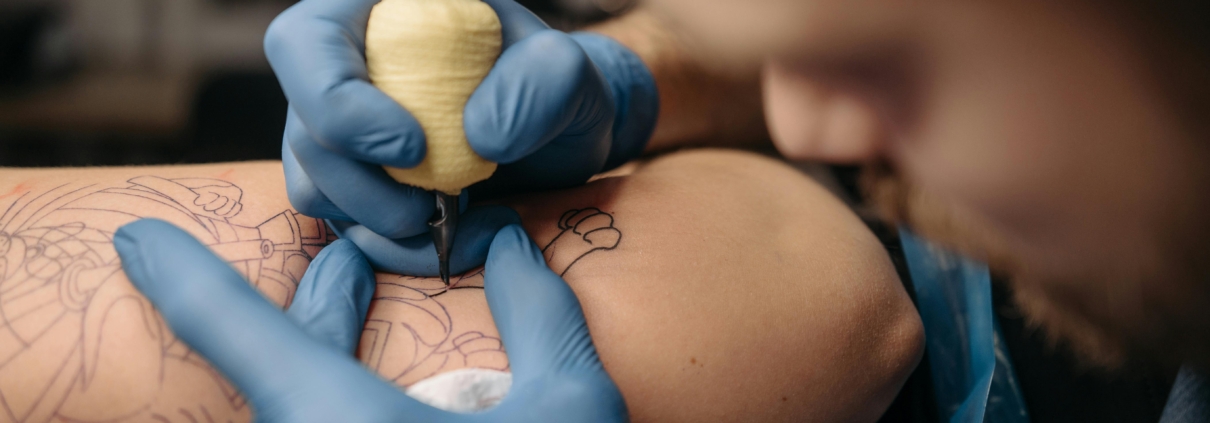Proper Tattoo Care—The Before and After of Getting a New Tattoo
Aftercare is a crucial topic. No matter how many people discuss it, aftercare facts need to be repeated over and over. Chances are that you’re here because you plan on getting a new tattoo or want to know how to properly take care of one you just received. You are in the right place. Not only do we know aftercare, but we also know some tricks to help your tattoo better so that the ink stays bright and vivid for longer.
Key Takeaways
- Keep your skin moisturized and limit sun exposure to prepare for the tattoo session.
- Follow aftercare instructions diligently for 1-3 months of healing.
- Gently wash with mild soap, moisturize with fragrance-free products, and monitor for infection signs.
- Choose experienced artists like those at Oracle Tattoo Gallery in Philadelphia.
How to Prepare For a Tattoo Appointment
The before is just as important as the after, and so you want to make sure you are taking care of yourself the days before your tattoo appointment. Make sure you are getting plenty of nutrition and staying hydrated, as a tattoo session can wipe you out physically and mentally if you are not prepared for it. Also avoid alcohol and any medications that may thin out the blood, such as aspirin and ibuprofen. Caffeine can also make it more difficult to sit through an entire tattoo session.
Furthermore, you want to keep your skin moisturized before your tattoo session. Don’t spend an entire day out in the sun and then expect to be able to sit for your session the next day.
You may think that going to the gym on the morning of your session is a good idea, but it’s not. Why? Working out can make the muscles tense, and that can increase the pain you feel while getting inked. If you want to be comfortable as possible, consider taking a rest day!
How to Care for a Brand New Tattoo?
Once you have your new tattoo, aftercare begins. This is incredibly important. Not following the aftercare instructions will impact your tattoo. You may not see it right away, but you will in the months and years after it has healed. Fortunately, aftercare is not difficult; it’s merely necessary.
The healing process of a tattoo is around 1-3 months. The size and complexity of your tattoo will impact how long it takes to heal. Keep in mind that small tattoos heal faster. Solid patches of fresh ink, such as a new blackout tattoo, will take even longer than a complex tattoo, because the injury covers more surface area.
The Importance of Keeping a Tattoo Covered
Keeping a tattoo covered during the initial stages of healing is crucial for several reasons, all of which contribute to the overall health and appearance of the tattoo. Here are some reasons why keeping a tattoo covered is important:
- Protection from Bacteria and Contaminants: After getting a tattoo, the skin is vulnerable to bacteria and contaminants that can lead to infection. Covering the tattoo with a bandage or plastic wrap creates a barrier that helps prevent harmful bacteria from entering the wound, reducing the risk of infection.
- Promotion of Healing: Keeping a tattoo covered helps create an optimal environment for healing. The covering helps retain moisture, which is essential for the skin to repair itself and for new skin cells to form. Additionally, covering the tattoo protects it from friction and irritation, which can hinder the healing process.
- Prevention of Bleeding and Excess Ink Leakage: It’s common for a tattoo to ooze blood and excess ink during the first few hours after getting inked. Keeping the tattoo covered helps contain these fluids, preventing them from staining clothing or bedding and reducing the risk of contamination.
- Minimization of Exposure to Sunlight and UV Rays: UV radiation from sunlight can be harmful to a new tattoo, causing the colors to fade and the skin to become irritated. Keeping the tattoo covered helps protect it from direct sunlight and UV rays, allowing the ink to set and the skin to heal properly.
- Reduced Risk of Scabbing and Scarring: Exposing a new tattoo to air and environmental factors can cause the skin to dry out and form thick scabs, which can lead to scarring and affect the appearance of the tattoo. Keeping the tattoo covered helps retain moisture and promotes the formation of thin, flexible scabs that are less likely to cause scarring.
Washing and Moisturizing Your Tattoo
You want to make sure that you also keep your tattoo clean. Use a fragrance-free soap to wash the area and gently pat the tattoo dry. Do not rub it, as this can re-injure the skin. Also avoid using water that is too hot. Lukewarm is best. Otherwise, the skin will become irritated by the hot water and that may also increase the time it takes to heal.
You may notice that your tattoo is oozing for the first feel days. This is normal. However, if you notice that there is blood or pus and inflammation, that is not a good sign. Your tattoo may be infected or you may be allergic to the ink.
As your tattoo heals, keep it moisturized—but not too much. Soothing tattoo gels with natural ingredients are best. You want to avoid ointments that are too thick, like petroleum jelly. Fragrance-free moisturizers and lotions made specifically for healing tattoos are best for keeping the skin hydrated without impacting the healing process.
Other Tips For Tattoo Aftercare
Now that you know the most important parts of the before and aftercare of getting a tattoo, here are a couple other tips you need to keep in mind:
- Avoid Scratching or Picking: Resist the urge to scratch or pick at your tattoo, as this can disrupt the healing process and lead to scarring or infection. If your tattoo feels itchy, gently pat or tap the area instead of scratching.
- Avoid Tight Clothing: Wear loose-fitting clothing that allows your tattoo to breathe and avoid tight or restrictive clothing that can rub against the tattoo and cause irritation.
- Avoid Swimming and Soaking: Avoid swimming, soaking in hot tubs, or submerging your tattoo in water for prolonged periods until it is fully healed. Moisture can soften the scabs and increase the risk of infection.
- Protect from Sun Exposure: Protect your new tattoo from direct sunlight and tanning beds, as UV rays can fade the colors and cause irritation. If you need to be in the sun, cover your tattoo with clothing or apply a broad-spectrum sunscreen with SPF 30 or higher.
Looking to Get a Tattoo in Philadelphia?
If you are looking to get a tattoo, knowing the before and aftercare is equally important. Follow the tips mentioned in this article, and your tattoo will heal well. It also helps to get your tattoo from a professional artist with years of experience like those at Oracle Tattoo Gallery in Philadelphia. Get your name in our books by calling us to schedule your consultation today. You can reach us at 215-638-1601 or by filling out the contact form.



